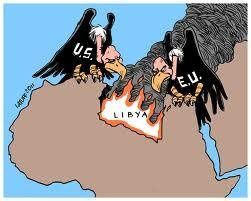Ali Gharib, The Electronic Intifada, 12 May 2009
 WASHINGTON (IPS) - US President Barack Obama issued a statement on 8 May calling for the renewal of sanctions on Syria, which were set to expire on Monday. The declaration came at the end of a busy week in which both high-level US officials and the Iranian president visited the Syrian capital, Damascus.
WASHINGTON (IPS) - US President Barack Obama issued a statement on 8 May calling for the renewal of sanctions on Syria, which were set to expire on Monday. The declaration came at the end of a busy week in which both high-level US officials and the Iranian president visited the Syrian capital, Damascus.
Though Syria has recently sought engagement with the US and Israel, the executive order extending sanctions is only the latest in a series of significant stumbling blocks to peeling off one of Iran's closest regional allies.
The renewed sanctions came on the heels of two-high profile visits to Damascus -- first by Iranian President Mahmoud Ahmadinejad and then US diplomat Jeffrey Feltman and Daniel Shapiro of Obama's National Security Council -- which exemplified the West's sometimes-faltering efforts to pull Syria away from Iran's influence.
Obama cited Syria's support for "terror," its weapons programs, and its "undermining" of US goals in Iraq -- collectively "the unusual and extraordinary threat to the national security, foreign policy and economy" of the US -- as reasons to extend the George W. Bush-era sanctions for one year.
Two weeks earlier, Representatives Mark Kirk of Illinois and Eliot Engel of New York wrote a letter to the White House urging Obama to "act quickly" and renew the sanctions.
According to the Washington Report on Middle East Affairs, which compiles statistics, Kirk received the most campaign donations from pro-Israel political action committees of any House member, $62,000 in total, in the 2007/2008 cycle. Engel was the second largest Democratic recipient in the House in that period, with $36,500.
But the extension of sanctions does not mean that the possibility of US engagement with Syria is disappearing. Indeed, there were indications that Obama's Mideast envoy, George Mitchell, would be visiting Syria next month.
Rather, the sanctions appear to be a reinforcement of the status quo.
"This is the clearest sign that negotiations between Damascus and Washington are going, if not badly, at least slowly, despite statements by both sides that progress is being made," wrote Oklahoma University professor Joshua Landis on his blog, Syria Comment.
"It tells us that despite the rhetoric about a 'new US relationship' to Middle Eastern countries, Washington still believes that it must keep its foot on Syria's economic throat in order to win concessions."
"The Syrians were hoping for a freebie with Obama. That's clearly not the case," Landis told IPS. "It's very clear that Washington is going to ask for a price for every little thing. In a sense, Washington wants Syria to show a change first."
One front the US has been highly critical of, and one where Syria could make such a first move, were it so inclined, is the transportation routes that militants use to cross into Iraq from Syria.
Dispelling the notion of an early Syrian concession, The Washington Post ran a front-page article by Karen DeYoung on Monday reporting on the "revival of a transit route" for armed groups. The route had fallen quiet in recent months, but according to DeYoung's report and a similar one from Agence France-Presse, activities are back up and running.
But the border isn't the only issue that the Syrians have been slow to move on. Ahmadinejad's visit reinforced the closeness of the two countries as well as their support for Palestinian groups like Hamas and the Lebanese Shia Hizballah organization, which are viewed as terror groups by the US.
On Tuesday, just one day before the US officials arrived for their second visit, Ahmadinejad and Syrian President Bashar al-Assad held a defiant press conference where they reaffirmed support for resistance movements against Israel.
"Syria and Iran have been from the very beginning united and in agreement to stand on the side of the Palestinian resistance. They will continue to do so. We see that the resistance will continue until all occupied territories are liberated," said Ahmadinejad, who met with several top officials of Palestinian organizations like Khaled Meshal, the Damascus-based head of Hamas.
Speaking to reporters two weeks ago, Syria's ambassador to the US, Imad Moustapha, said that there had been indications that the US would be willing to engage Syria even if the heads of these groups were not kicked out of Damascus.
Syria has hinted that it would support a "grand bargain" approach that would see several inter-connected regional peace initiatives, but prospects are dimming that Israel, possibly discouraged by Syria's continued support for rejectionist groups, would be willing to make the concessions that would allow such a deal. One of Syria's non-negotiable goals is an end to the occupation of the Golan Heights, captured by Israel during the 1967 war.
Under Prime Minister Ehud Olmert, Israel had been in Turkish-mediated peace talks with Syria until they were broken off during the Israeli army's brutal three-week incursion into the Gaza Strip.
"They had spent a lot of energy doing the Olmert thing in Turkey," Landis said. "No one believed anything would happen under Olmert, but the idea was you get momentum and create things. [Now] the Syrians feel like they're being played and they're getting asked to do a strip tease, and they're not going to get anything but knowing glances from Israel."
Indeed, the young right-wing government of Israeli Prime Minister Benjamin Netanyahu gave even less than a "knowing glance" over the weekend.
"Remaining on the Golan will ensure Israel has a strategic advantage in cases of military conflict with Syria," Netanyahu told reporters on Thursday. He reaffirmed that he didn't intend to withdraw from the strategic plateau during a cabinet meeting Sunday.
With the Golan Heights off the table, resumption of meaningful talks is unlikely.
Among some US experts on Mideast peace talks, Syria's peace with Israel -- an important step in pulling it out of Iran's orbit -- was once seen as a low-hanging fruit in the region: Israeli withdrawal would not necessitate the removal of large numbers of settlers as they would in the West Bank as part of a peace accord with Palestinians.
But it appears that the US will continue to push its dialogue with Syria even as it sanctions the country. Though former-Senator George Mitchell, Obama's special envoy to the region, did not visit Syria on a comprehensive tour last month, the Arab newspaper al-Hayat said US Deputy Assistant Secretary of State David Hale indicated that Mitchell would visit Lebanon and Syria on his next trip to the region.
Nonetheless, Assad's continued support for Palestinian groups and Netanyahu's comments demonstrate that such a deal looks nearly impossible in the short term.
All rights reserved, IPS - Inter Press Service (2009). Total or partial publication, retransmission or sale forbidden.
Latest articles on EI:
| Palestine : Development: Obama administration renews Bush-era sanctions on Syria (12 May 2009) |
| Palestine : Development: Palestinian Authority popularity at all-time low (12 May 2009) |
| Palestine : Opinion/Editorial: Hizballah today, Hamas tomorrow (12 May 2009) |
| Palestine : Human Rights: Israel's psychological siege (11 May 2009) |
| Palestine : Opinion/Editorial: In Ireland or Palestine, strength in unity (11 May 2009) |
| Palestine : Activism News: Envisioning a better future: Activist Mazin Qumsiyeh interviewed (11 May 2009) |
| Palestine : Opinion/Editorial: An injury to one ... (10 May 2009) |
| Palestine : Human Rights: Palestinians rebuild with mud (8 May 2009) |
| Palestine : Development: UN chief defends "watered down" Gaza report (7 May 2009) |
| Palestine : Human Rights: Rights orgs: Donor aid shouldn't underwrite Israeli crimes (7 May 2009)http://electronicintifada.net/v2/article10524.shtml |


![Géopolitique : Union transatlantique, la grande menace, par Alain De Benoist [tribune libre] Géopolitique : Union transatlantique, la grande menace, par Alain De Benoist [tribune libre]](http://www.breizh-info.com/wp-content/uploads/2014/06/tafta.jpg)













































